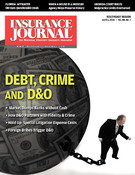When it comes to doing the right thing, our desires often get in the way. They cause us to veer down a crooked path that leads us away from what we should do to what we want to do. That’s according to ethics research slated to be released by the University of Utah later this year.
“The Ethical Mirage: A Temporal Explanation as to Why We Aren’t as Ethical as We Think We Are,” which will be published in Research in Organizational Behavior, examines the psychological processes of individuals and how they deceive themselves into thinking they are ethical people.
For example, individuals know they should behave ethically when negotiating with a client, but during the actual negotiation their desire to close a deal may cause them to make misleading statements and later justify doing so to others.
Folks in the insurance industry are not immune to such behavior. Producers are pushed to build customer relationships and bring in new business. If the working environment becomes too demanding employees and managers may be “pushed to find the gray areas to increase the corporate bottom line,” according to John Borbi, a former financial advisor and investment specialist.
Borbi should know, he went from managing close to $100 million dollars for his clients and ranking in the top 1 percent of financial advisors nationally, to becoming a financial thief and spending two years in federal prison in West Virginia.
Borbi, the keynote speaker at a recent event sponsored by the Chartered Property Casualty Underwriters Society Golden Gate Chapter, noted from his first-hand experience how easy it is to “go down the wrong path.”
When someone breaks the law by speeding, talking on a cell phone while driving, or stealing office supplies, it’s easy to justify those actions. But what happens every time someone crosses the line is that it becomes easier to justify those decisions, and the line keeps moving, he said.
Kristina A. Diekmann, Ph.D., University of Utah professor of management and one of the four authors of the “The Ethical Mirage,” echoed that statement. It is particularly problematic “when people deceive themselves into thinking they are ethical but don’t act accordingly, it encourages the continuation of negative behavior,” she said in a release announcing her research.
Borbi, the former investment advisor, recommends that everyone “examine daily choices we all make that may be unethical and then explore how we all find ways to justify our own decisions, even though they may be unethical.”
But Diekmann and her fellow researchers contend that little or no attention has been paid to the individual faced with the ethical dilemma. As a result, individuals often “are not conditioned to think of the ethical consequences at the time of the decision,” Diekmann said.
That is something the researchers aim to do — focus on individual perceptions and come up with recommendations on how to help each of us do the right thing.
Was this article valuable?
Here are more articles you may enjoy.


 Florida Engineers: Winds Under 110 mph Simply Do Not Damage Concrete Tiles
Florida Engineers: Winds Under 110 mph Simply Do Not Damage Concrete Tiles  Fla. Commissioner Offers Major Changes to Citizens’ Commercial Clearinghouse Plan
Fla. Commissioner Offers Major Changes to Citizens’ Commercial Clearinghouse Plan  Zurich Insurance Profit Beats Estimates as CEO Eyes Beazley
Zurich Insurance Profit Beats Estimates as CEO Eyes Beazley  Viewpoint: Runoff Specialists Have Evolved Into Key Strategic Partners for Insurers
Viewpoint: Runoff Specialists Have Evolved Into Key Strategic Partners for Insurers 


